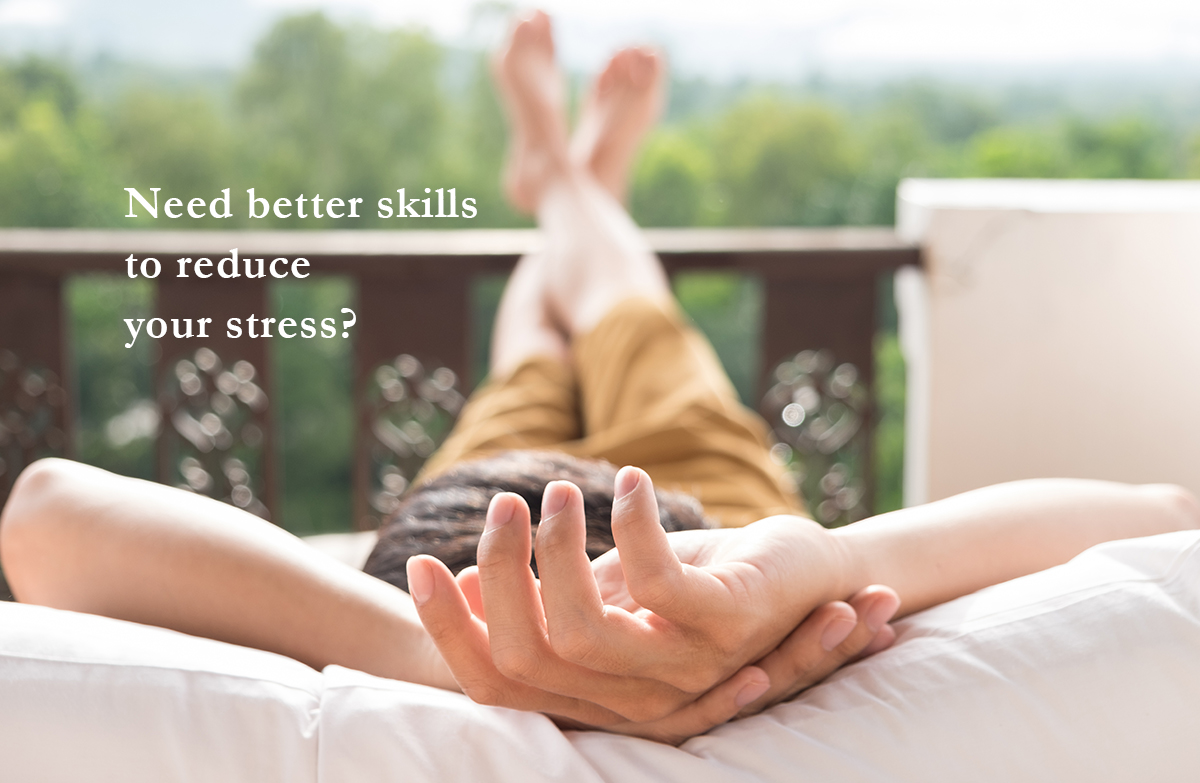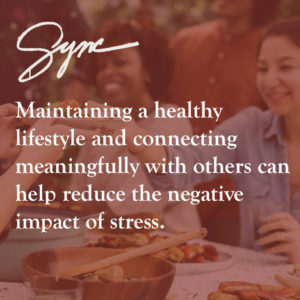
HOW TO COPE BETTER WITH STRESS (AND USE HEALTHY COPING STRATEGIES)
In this post, Heather Inouye will help you identify ineffective coping strategies and implement more effective alternatives to cope better with stress.
This article will help you:
- Identify your current approach to stress management (typical coping strategies)
- Acquire practical tools to cope better with your immediate stress symptoms
- Learn and practice effective coping strategies to manage your long-term stress

Heather Inouye is a Registered Associate Marriage and Family Therapist (#110232) based in Sierra Madre, California. Heather is currently under the supervision of Annie Miller, LMFT (#52595). To learn more about Heather and what she does, take a look at her profile.
Identifying how stress affects you isn’t always easy
Do you feel overwhelmed? Maybe it’s hard to find words to describe how you feel or it’s uncomfortable to admit to yourself or others that it’s hard to cope, which can make the experience pretty lonely.
Perhaps you’re at a point where, when you hit road bumps, your metaphorical shock absorbers don’t work too well so you find yourself with frayed nerves and spilled coffee.

Relying on ineffective methods to cope with stress can impact all aspects of your life, preventing you from accomplishing your life’s mission, damaging important relationships, and thwarting your ability to enjoy life’s big and little pleasures. Over time, it may even result in significant health concerns.
People have different capacities to bounce back after challenging situations. Whatever your current ability, learning better coping strategies can help to reduce your immediate and long-term stress-related symptoms.
First, let me start with an example of unhealthy coping from my own life. Then, I’ll discuss different coping strategies—including my favorite ineffective one. Lastly, I’ll offer some tips to cope better with stress.

My stress and “Favorite” (ineffective) coping strategy
Long ago, I learned that if I ignored a problem, I could avoid negative feelings associated with it. When a problem arose, I’d ignore it and hope it would go away. It seemed to work when I was younger. But then, I found myself with many more responsibilities. I realized that with the new level of demands, this strategy was no longer effective.
My day of reckoning came in graduate school when all of my classes had multiple assignments (and every professor seemed to think that his or her class was the only one I had). This pressure—along with everyday worries, my day job, demands at home, requests from friends, commitments I’d made to organizations—overwhelmed me. So, I avoided whatever stressed me out. But you can only put off school assignments for so long, and if you do, you’re likely to find yourself even more stressed out at the end of the quarter because you’re having to do them at the same time as you’re also taking final exams and reapplying for financial aid.
The moral of my story? We all have problems and the more we have, the more critical it is not to ignore or avoid addressing them, but to tackle them head-on. That’s why I’m writing this post.
I hope to provide you with skills to better cope with stress.
What is Stress?
Everyone experiences stress sometimes. People may encounter fewer or more frequent situations that are potentially stressful, depending on overall life context (including family or financial concerns, changes in marital status, or moving), vocational choice (with related issues like workload, management issues, lack of adequate support, or difficult working conditions), and uncontrollable circumstances (like the death of someone you care about, job loss, or a chronic illness or injury).
Stress is “a state of mental or emotional strain or tension resulting from adverse or very demanding circumstances,” according to the Oxford American Dictionary.
Whether you experience stress during a challenging situation depends on whether you consider the situation to be threatening and whether you believe yourself capable of managing or adapting to the situation (OpenStax College; Selye, 1974).
If you believe that you have adequate coping skills, you’re more likely to feel confident in your ability to manage or adapt to a challenging situation and should, therefore, experience less stress overall. The less stress you feel, the more challenges you can take on, while still being the caring, passionate, innovative, collaborative, complex problem-solver and change-maker with a commitment to excellence that you want to be.

WHAT IS COPING?
Coping includes cognitive and behavioral strategies that a person uses to address stress-related difficulties, their presumed source, and associated negative feelings (OpenStax).
Think about a recent time when you were stressed out or anxious. What did you do about it? Did it help?
There are two types of coping. One is emotion-focused and the other is problem-focused (OpenStax; Lazarus and Folkman, 1984).
WHAT IS EMOTION-FOCUSED COPING?
Emotion-focused coping is a type of mental gymnastics intended to decrease uncomfortable feelings. When faced with a difficult situation, have you ever found yourself doing one or more of the following: (1) avoiding thinking about or dealing with the issue, (2) playing down its importance or impact, (3) telling yourself that you’re much better off than others, or (4) focusing on a potentially positive aspect of an otherwise challenging situation (OpenStax)? If so, you have engaged in emotion-focused coping.
WHAT IS PROBLEM-FOCUSED COPING?
Problem-focused coping involves using a problem-solving process to resolve a challenging situation (OpenStax).
Typically, a process like this would entail identifying a problem, brainstorming potential solutions, analyzing the costs and benefits of alternatives, and selecting one (OpenStax).
WILL EMOTION-FOCUSED OR PROBLEM-FOCUSED COPING HELP YOU COPE BETTER WITH STRESS?
While emotion-focused coping may be helpful in truly uncontrollable situations (for instance, sitting at the bedside of a comatose loved one), people often resort to emotion-focused coping when a problem-focused coping method would be more effective.
Instead of ignoring overwhelming assignments, I learned that listing my assignments with their deadlines, prioritizing, seeking help from classmates or professors, if necessary, and then completing the assignments was more productive and effective in reducing stress than was complaining about my unreasonable professors or watching television.
HOW TO COPE BETTER WITH STRESS
Instead of avoiding your problems, use problem-focused coping.
Use a problem-focused coping strategy.
While it may be tempting to cope with stress by avoiding it, don’t. When you finally do tackle your problem, you might have less time and fewer options, resulting in even more stress.
A problem-focused coping strategy often starts with breaking things down.
Wondering where to start?
- Find ways to break your problem down into smaller, more manageable parts.
- If you need help, ask for it.
- Tackle the parts one at a time.
PRACTICAL TIPS TO IMPROVE YOUR ABILITY TO COPE BETTER WITH STRESS
Stress impacts everything: body, mind, emotions, and spirit. Beyond practicing problem-focused coping whenever possible, other keys to reducing the negative impact of stress include maintaining a healthy lifestyle and connecting meaningfully with others.

Adopt a healthy lifestyle
Important tips for a healthy lifestyle include:
- Eat healthy meals and snacks (major in vegetables, fruits, and complex carbohydrates and avoid stress eating and self-medicating with drugs/alcohol)
- Get sufficient sleep (for most people, this means about 8 hours/night)
- Exercise daily
- Connect with others and cultivate and receive social support (this includes emotional and practical support)
- Participate in life-giving, recreational activities
- Breathe deeply.
(Check out the additional resources from (1) Laurie Pearlman, senior consulting psychologist at the Headington Institute, which serves relief and development workers and emergency responders and (2) the Centers for Disease Control and Prevention in the references below.)
Other unhealthy coping strategies and healthier alternatives
-
Don’t Overcontrol (workaholism, perfectionism): Balance Your Life.
If you tend to cope through excessive control (that is, you work constantly or need everything to be perfect), try this:
Adopt a balanced rhythm of work, play, and rest. Identify activities that help you relax and be sure to integrate them into your day. Read a novel. Play with a child or a pet. Listen to music. Take a bubble bath. Stick to a healthy bedtime.
-
DON’T ESCAPE: ENGAGE WITH THE WORLD (IN HEALTHY WAYS).
If you tend to cope by finding ways to avoid, ignore, deny, minimize, or escape your stress, you’re probably trying to dull anxious feelings. Instead of trying to shut out the world, try this:
Note your favorite unhealthy methods to comfort yourself, then, try healthier substitutes. If you use food, drugs, or alcohol to self-soothe or spend excessive amounts of time on social media, gaming, or zoning out, try something different. Find healthy ways to engage with the world. Eat healthy snacks. Plan a fun or relaxing time with a friend. Take a practical step—no matter how tiny—towards resolving whatever bothers you.
-
DON’T ISOLATE: REACH OUT FOR SUPPORT.
While the experience of stress itself can be isolating, when stressed, some people choose to disconnect intentionally, hoping to prevent others from finding out how stressed out they actually are, to avoid additional stress caused by others’ demands, or because they prefer to figure things out by themselves and are irritated by others’ input. However, by isolating, they cut themselves off from a valuable source of emotional and practical support—others’ care.
If this sounds familiar, try this: think of someone you feel safe with and connect.
It can be a trusted family member, a spiritual guide, a mentor, or a friend. It can even be a counselor. If you live near Sierra Madre, California, I welcome you to call me for a free consultation or to set up the first appointment.
The critical part is reaching out, feeling heard, and getting support.
WHEN SHOULD YOU GET MORE HELP?
While implementing strategies to cope with stress may help to reduce your overall stress level or improve your ability to bounce back after challenging situations, sometimes it may not be enough.
There IS more support available. If you’re unsure if you, or a loved one, needs more support, this might help.
Do any of the following statements apply to you?
You’re:
- Feeling stressed out, sad, or depressed, for more than two weeks
- Struggling to care for yourself or your family
- Having difficulty managing work- or school-related activities
- Depending on alcohol or drugs to cope
- Thinking about suicide (even if you don’t believe you would do it).
If so, seek additional support from a mental health provider, a physician, or a spiritual or community leader or organization.
REFERENCES
Centers for Disease Control and Prevention. “Coping with Stress.” <https://www.cdc.gov/violenceprevention/suicide/copingwith-stresstips.html>.
Folkman, S., & Lazarus, R. S. (1980). An analysis of coping in a middle-aged community sample. Journal of Health and Social Behavior, 21, 219-239.
OpenStax College, Psychology. OpenStax College. 8 December 2014. <http://cnx.org/col11629/latest/>.
Pearlman, Laurie. “Preventing Burnout.” 12 June 2013 <https://headington-institute.org/blog-home/229/preventing-burnout-part-1>.
Selye, H. (1974). Stress without distress. Philadelphia, PA: Lippencott.
stress [Def. 2]. (2016) New Oxford American Dictionary. Oxford University Press.
If you want some guidance on finding THE RIGHT therapist, this might help.

